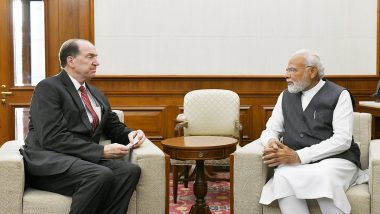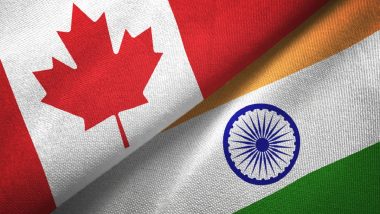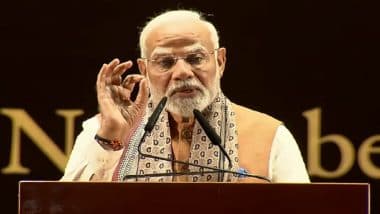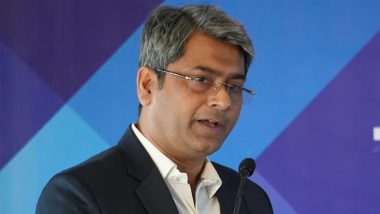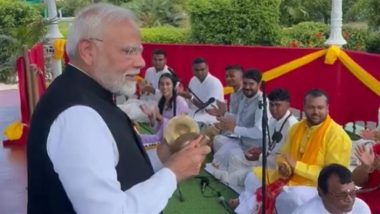New Delhi, February 23: World Bank President David Malpass met Prime Minister Narendra Modi on Thursday. During the meeting, President Malpass commended India on maintaining solid growth during the global slowdown and encouraged further progress to improve the business-enabling environment and advance the energy transition.
Malpass is in India to attend a meeting of G20 Finance Ministers and the governors of the central bank. Prime Minister Modi and Malpass discussed India in terms of "Amrit Kaal" and the goal to achieve and sustain 8 per cent growth as India approaches the 100th anniversary of its Independence in 2047. World Bank Says India Is in Better Position To Navigate Global Headwinds Than Many Other Countries, Says PM Narendra Modi.
World Bank President David Malpass Meets PM Narendra Modi
Enjoyed sitting down with @PMOIndia @narendramodi in Delhi to affirm @WorldBank Group support for India in “Amrit Kaal” to achieve & sustain high growth rates.
Important to increase private sector investment & advance India’s energy transition.
Readout: https://t.co/DKo4N9K5Fj pic.twitter.com/Df7JXwal6G
— David Malpass (@DavidMalpassWBG) February 23, 2023
President Malpass noted the importance of increasing private sector investment and commercial credit growth as India builds competitiveness in global value chains.
Malpass encouraged the expansion of capital markets and more pathways to de-listing of companies as steps to attracting large new inflows of foreign direct investment.
Malpass and Prime Minister Modi also discussed the role and cost of various subsidies and the importance of targeted support for small farmers and vulnerable sectors.
WB President Malpass welcomed the government's new budget and the recent stability of the rupee, which are both key steps to fast and sustainable growth. He expressed the World Bank Group's support for increased female labour force participation, expanded infrastructure, green finance, sustainable agriculture, and renewable energy.
WB President and Prime Minister Modi also discussed agricultural policies that could increase efficiency and crop yields while better utilising scarce water and electricity resources, and the LiFE initiative for environmental awareness around the world.
Looking ahead to the G20 summit hosted by the government of India, President Malpass, and Prime Minister Modi discussed India's priorities, action on debt for low-income countries and vulnerable middle-income countries, and the role and evolution of international finance institutions.
(This is an unedited and auto-generated story from Syndicated News feed, LatestLY Staff may not have modified or edited the content body)













 Quickly
Quickly








